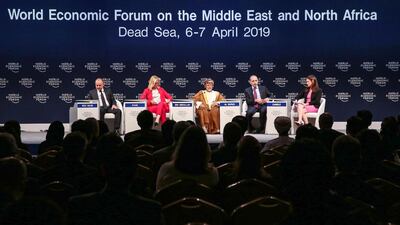The decisions taken by the United States that favour Israel’s claims on Jerusalem and the Golan Heights risk engulfing the Middle East region in yet more conflict and tension, Jordan’s foreign minister said on Saturday.
Ayman Safadi said that addressing conditions of despair and lack of opportunity is the key to resolving the problems facing the Middle East and North Africa, including the threat of radical groups such as ISIS.
However, recent moves by Washington that include moving its embassy to Jerusalem and recognising Israel’s sovereignty over the occupied Golan Heights that it took from Syria, “deepens the environment of frustration and hopelessness and that is going to engulf all of us in more conflicts and more tension unless we are able to stop and re-assess what the solutions are”.
Mr Safadi was speaking at the World Economic Forum meeting at the Dead Sea where about 1,000 government and business leaders have gathered to discuss ways to coordinate responses to some of the region’s most critical issues including the Syrian refugee crisis and the suffering of the Palestinian people under Israeli occupation.
Mr Safadi said that the only just resolution to the Palestinian-Israeli conflict was the two-state solution.
“Palestinians want a state and anything short of that, the Palestinian people will not accept,” he said.
On the Golan, he said the US decision was wrong from a number of perspectives, including international law.
At the Arab League meeting in Tunis last month, leaders said they would seek a UN Security Council resolution against Washington’s move.
“The US is a major player. Every crisis in the region would benefit enormously from an active US engagement and we encourage that engagement but I think it is our duty to our people, to our region and the world is to say things how they are,” Mr Safadi said.
“You cannot ignore there is an occupation [in Palestine] that needs to be ended for this to be achieved. You cannot ignore that there is a crisis in Syria, that yes has quieted down in terms of military activity but in terms of its implications they are still pretty much strong,” he said, highlighting the 1.3 million Syrians currently living in Jordan.
Mr Safadi said that while the US continues to have a key role in the region that it is important that Jordan engages with Washington in a frank and positive manner.
“When they made their decision on Jerusalem his majesty [King Abdullah] was very clear it was something we cannot, would not and did not accept,” he said.
Jerusalem is a critical issue for Palestinians and the US move is broadly viewed as an attempt to shape the final status issue in favour of Israel.
Mr Safadi made his comments during a discussion that also included Yusuf Bin Alawi Bin Abdullah, Oman’s foreign minister, Elias Bou Saab, Lebanon’s minister of national defence and Sigrid Kaag, the Netherlands’ minister of foreign trade.


